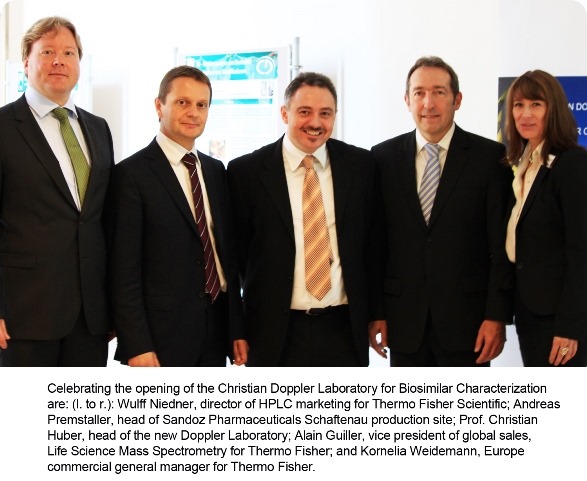Oct 23 2013
The Christian Doppler Laboratory for Biosimilar Characterization is now open at the Paris-Lodron University of Salzburg, and scientists there have commenced developing new methods for characterizing proteins to be used in biopharmaceuticals.

The new facility, co-funded by the Austrian Federal Ministry of Economy, Family and Youth, as well as the County of Salzburg through the Christian Doppler Society, was established to develop and transfer to practice novel and more efficient methods to characterize the active ingredients in protein-based medicines. Scientists from University of Salzburg, Sandoz Pharmaceuticals and Thermo Fisher Scientific are collaborating in these efforts.
“The more physical, chemical and biological data we can obtain for protein-based drugs, the more certain we can be that they will produce the desired effects and will not produce unexpected adverse effects,” explains Prof. Christian Huber, head of the new Christian Doppler lab. “Here, we are joining expertise in protein production and characterization, structural biology and synthetic chemistry at the University of Salzburg to develop innovative characterization tools to determine the efficacy and safety of protein-based medicines.”
“As the leader in protein characterization technology, we are confident that we will make a significant technical contribution to the detailed analysis of biosimilars and their quality control,” observes Dr. Alain Guiller, vice president of global sales, life science mass spectrometry (LC-MS) at Thermo Fisher Scientific. “This is a rapidly-developing field, and this close cooperation with the University of Salzburg and Sandoz will increase our understanding and help us to serve the emerging needs of the pharmaceutical industry.
Thermo Fisher’s participation will focus on providing expertise for applying Orbitrap-based LC-MS technology, nano-UHPLC (ultra high-perfomance liquid chromatography) systems and columns, and software to future workflows for protein-based drug characterization and quality control.
“For us, the collaboration constitutes an important means to gain access to very recent technologies for industrial application, in order to make our production safer and more efficient,” adds Dr. Andreas Premstaller, head of Sandoz’ Schaftenau production site.
About Thermo Fisher Scientific
Thermo Fisher Scientific Inc. is the world leader in serving science. Our mission is to enable our customers to make the world healthier, cleaner and safer. With revenues of $13 billion, we have 39,000 employees and serve customers within pharmaceutical and biotech companies, hospitals and clinical diagnostic labs, universities, research institutions and government agencies, as well as in environmental and process control industries. We create value for our key stakeholders through three premier brands, Thermo Scientific, Fisher Scientific and Unity Lab Services, which offer a unique combination of innovative technologies, convenient purchasing options and a single solution for laboratory operations management. Our products and services help our customers solve complex analytical challenges, improve patient diagnostics and increase laboratory productivity. Visit www.thermofisher.com.